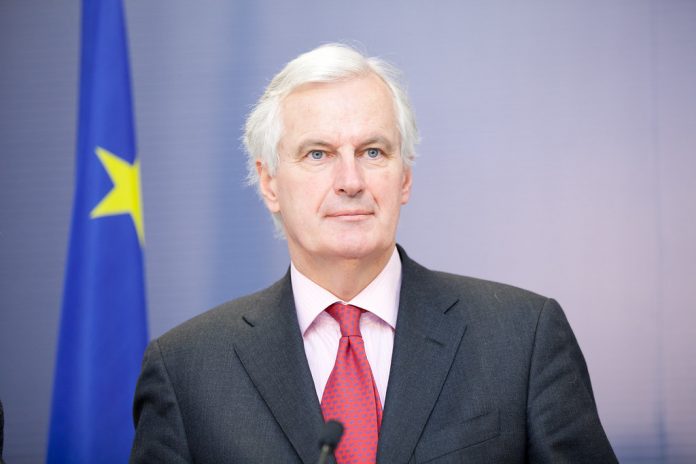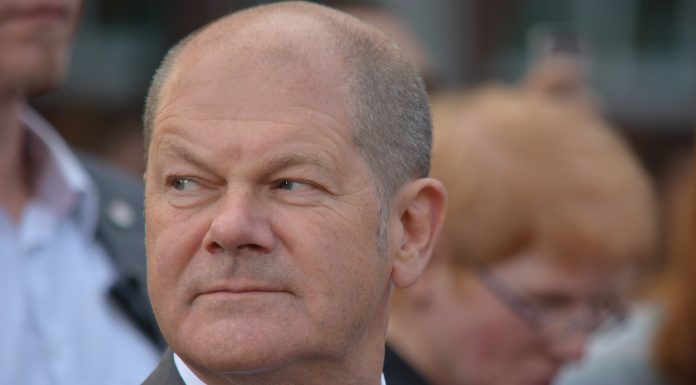
Michel Barnier, the EU’s former chief Brexit negotiator, who previously also served as French Foreign Minister, made a big splash today, stating that immigration in the EU was “not working”, as the EU’s external borders had become a “sieve”.
This intervention is widely seen as part of an attempt by the 70-year-old to challenge French President Emmanuel Macron in the French presidential elections in 2022.
Barnier specified:
“I think we have to take the time for three or five years to suspend immigration. (…) I’m not talking about students or refugees, who we need to treat with humanity and care, but we need to examine all the procedures, we have to discuss Schengen with our neighbours, we have to apply controls on borders, we need to be more rigorous.”
Suspending legal immigration from outside of the EU would be massively distorting to the EU economy, so maybe that doesn’t seem to be what Barnier is hinted at. He really seems to point at controlling non-EU immigration, noting that there were “links” between immigration and “terrorist networks that infiltrate migrational flows”, while also citing human smuggling as a major concern.
« Il faut suspendre l'#immigration pendant 3 ou 5 ans et il faut discuter de #Schengen avec nos partenaires européens.»
▶️ #les4V @Caroline_Roux pic.twitter.com/yPh4D7fylW
— Caroline Roux (@Caroline_Roux) May 11, 2021
To be fair, he did mention changes to Schengen, but he wants to do that in concertation with other EU member states. Given how Schengen rules have already been applied in a flexible manner, both during the 2015-2016 immigration crisis and during the Covid crisis, big changes should not be expected here. In this regard, it is also important to distinguish Schengen arrangements, which involve whether there are passport checks to travel between EU countries, with “freedom of movement”, which relates to the right to permanently settle as an EU citizen in another member state.
Interestingly, Barnier also intends to tackle family reunification. Here, real changes at the EU level are needed, as this is governed by EU rules, for example the 2003 Directive on the right to family reunification.
According to former Belgian Migration Minister Theo Francken, this directive complicates attempts by EU member states to restrict family reunification, which in Belgium was at one point the most important route to migrate.
His former adviser, Joren Vermeersch, has proposed for the EU to simply “abolish” EU family reunification legislation and hand back all powers to govern migration to member states, except for repatriation policy, border protection and short term visa. He thereby remarked that Denmark’s opt-out – secured after it rejected the Maastricht Treaty in the 1990s – on the matter has really enabled the country to set extra requirements aimed to increasing the chance for partners to integrate in society.
Belgium, on the contrary, which in 2011 abolished the right for Belgian citizens to family reunification with parents or grandparents with a foreign nationality, wasn’t able to go as far, due to EU rules to apply this restriction to EU citizens residing in Belgium. In the past, Dutch restrictions on family reunification have led to Dutch citizens migrating to Belgium to circumvent Dutch rules, a practice which EU rules made it harder for Belgium to tackle.
In this regard, perhaps also former British PM David Cameron’s EU reform deal can serve as inspiration. This provided for changes to EU rules, enabling EU member states to deny residence to those abusing free movement rules to enter a country while exploiting EU family reunification rules. The backdrop of this were UK complaints on how EU rules would have allowed non-EU citizens to use marriages of convenience to enter the UK.
Following Barnier’s intervention, some have therefore made the point that these are precise the kind of changes that may have helped to prevent Brexit:
If the European Union had suspended immigration and freedom of movement in 2015 the United Kingdom would still be in the European Union. Funny how things change. https://t.co/SyqzlW8i7R
— Matt Goodwin (@GoodwinMJ) May 11, 2021
Whether that’s the case, is up for debate, but in any case, choices over immigration are so sensitive that it is better to leave them as much as possible to national democratic debate. National politicians already have a hard time convincing electorates they have conducted the right immigration policy. For supranational institutions, it is virtually impossible to do that. Fundamentally, we should have trust in European democracies that they won’t be heartless and that they will still allow family reunification, as long as there aren’t any abuses.
Also those that are keen to promote more economic migration to Europe, to full labour shortages, should be keen to grant EU member states more leeway to restrict family reunification. Given that there is a certain democratic limit to “reception capacity”, sometimes a choice needs to be made between welcoming a foreign nurse or certain family members of non-EU citizens.
In this regard, it is also a must to mention the role played by the European Court of Justice, which has for example ruled that the EU Charter of Fundamental Rights prevents repatriating criminals to their home countries in specific cases, for example when there is a well-founded fear of persecution, causing accusations of judicial activism. This only to illustrate that the more EU rules there are to govern migration directly or indirectly, the greater the scope for the EU machinery to restrict the policy freedom of national democracies.
Nevertheless, the EU can play a positive role in controlling migration, which is the prerequisite for maintaining popular support for it, knowing that it fundamentally brings a lot of good in today’s globalized world.
Barnier’s intention to control migration may be helped to a certain degree by sharpening up EU family reunification rules, but ultimately the litmus test will not be whether it is possible to reduce migration flows that are currently legal but whether it is possible to strongly reduce illegal migration, something which has heated up in recent weeks, alongside good weather, as for example last Sunday, 1400 “asylum seekers, migrants and potential refugees” arrived on the Italian island of Lampedusa. This year, 11,000 illegal migrants have arrived Italy during the first five months of 2021, which is up from 4,105 in 2020.
In theory, this should be called “irregular migration”, given that those arriving in this way still may be able to receive a positive asylum response, but more than half of requests are rejected in first instance and many people do never even bother to apply for asylum.
To deal with this, Barnier has cited EU plans to strengthen Frontex, its border agency, with the deployment of 10,000 new uniformed guards. This may however not have prevented the 1400 people arriving on Lampedusa, unless, as is rumoured, Frontex would be working together with the Libyan coast guard, which contains Libyan militias that are known to torture and extort migrants for ransoms in detention centres.
Pushing people back without allowing them to request asylum would be a violation of EU rules and human rights. Australia’s approach has managed to reconcile firm border protection with maintaining the right to asylum, by bringing everyone trying to sneak in illegally to places outside of its territory.
A similar approach was decided by EU leaders at their Summit in 2018, to negotiate with non-EU countries like Tunesia or Egypt to convince them to bring people saved at sea over there, at “disembarkation centers”. There, they would then be allowed to apply for asylum. Those denied would then be repatriated. Obviously, the conditions in these centers should be better than the ones provided by Australia, but Australia’s policy has managed to avoid thousands of drownings at sea. In theory, one would think also those denied asylum in the EU could be brought there, awaiting their repatriation, but in practice, those numbers are simply so gigantic that in reality, most who have managed to sneak into the EU illegally will be able to stay.
In any case, Egypt, Albania, Morocco, Tunisia and Algeria all simply openly rejected the idea to host “disembarkation centers” out of hand.
This is despite the fact that these countries all enjoy EU financial support, which is often suffering from “endemic corruption”, according to the European Court of Auditors.
If Barnier is actually serious, he should pick up this idea again, instead of putting his hopes on ever more EU border guards. The problem is not that there aren’t enough guards to check whether people are sneaking into the EU illegally. The problem is that when people are caught, they can simply stay, in turn rewarding the business model of human smugglers.
Now why would non-EU countries be willing to play ball now?
What has not been tried yet is to link EU development aid spending and visa arrangements with EU demands, when negotiating with Europe’s neighbourhood. EU demands should then not only include hosting the “disembarkation centers” but also convincing countries to welcome back their own citizens when they are denied asylum in Europe. Tunesia typically complicates cooperation here, while also Morocco often simply refuses to meet with a Dutch Minister to discuss welcoming back its own nationals, even when they have committed crimes.
In a way, if such an arrangement works well, the likes of Tunesia and Morocco would actually witness less illegal migration on their territory, as word would go around quickly that unless one has a genuine chance to obtain asylum in the EU, there is not much point paying a lot of money to human smugglers to cross the Mediterranean. If it doesn’t work, an even more ambitious approach will be needed.
Joint EU foreign policy action could be valuable when it comes to controlling migration, certainly when using the EU’s financial leverage, so the likes of Michel Barnier should really revert to the plan to host “disembarkation centers” outside of the EU, bringing development aid and visa arrangements into the negotiation with the EU’s neighbourhood. Somehow, despite the nervousness of European electorates over uncontrolled migration, this has not been tried yet.












